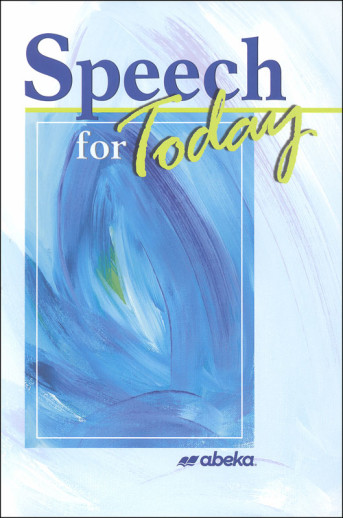We use cookies to make your experience better. To comply with the new e-Privacy directive, we need to ask for your consent to set the cookies. Learn more.
Speech for Today
Speaking before an audience is intimidating on two levels: authoring the content and then presenting it – with all eyes on you. With this Abeka® introductory speech course, students will first learn to manage nonverbals, voice, and their overall presentation using poetry, scripts, famous speeches, etc. As students focus on concepts like rhythm, articulation, gestures, and the like, they will become more comfortable in their own skin and better able to concentrate on their content.
The course provides a unique selection of assignments (incorporating prewritten- and student-written content, informal and formal presentations for a variety of purposes), with a uniquely balanced emphasis on nonverbal and vocal skills. Course assignments start with everyday applications such as phone exchanges, one-on-one, and group conversations. Then, students work toward impromptu speeches; intro to parliamentary procedure; pantomimes; and monologues. The course's latter weeks move to declamation (reciting famous speeches), poetry and storytelling, written speeches, and types of oral interpretations. Unique to this Christian course, students will compose and give their personal salvation testimony, a devotional (what the student has been learning from God's Word), and more. Conducting speech class can often be tricky to pull off in a home school situation, but many of these assignments are easily done in the home, small group, or as a class. While this ½ credit course is recommended for grade 11, consider it for any student ready for an introductory speech class.
If, like me, you dreaded speech class in high school, you have no need to fear how you will guide students. A spiral-bound, consumable Teacher's Guide provides tips on managing students, giving constructive criticism, and helping students write, practice, and present. Sample grading sheets and practice time sheets are also included (perforated, 59 pages). The Student Book is non-consumable, and includes indexes of material to be used for oral interpretation, 211 pgs, pb. ~ Ruth
| Product Format: | Paperback |
|---|---|
| Brand: | A Beka Book |
| Grade: | 11 |
| Length in Inches: | 9 |
| Width in Inches: | 6 |
| Height in Inches: | 0.375 |
| Weight in Pounds: | 0.65 |

